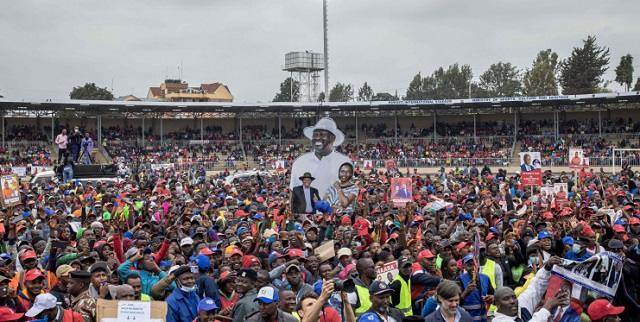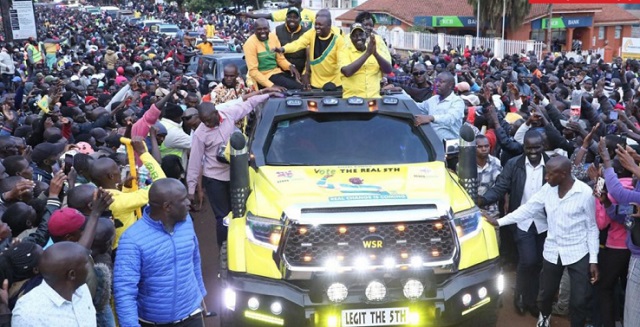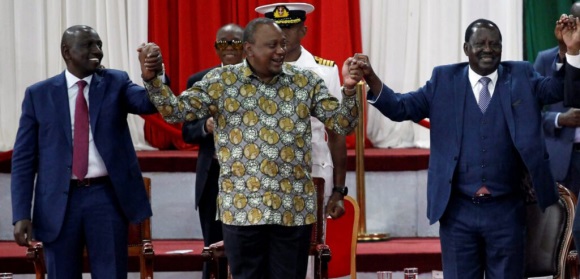
High stakes of August 09 presidential vote
NEWS ANALYSIS | THE INDEPENDENT | The 9 August presidential vote in Kenya pits the incumbent’s favourite against a populist challenger. It will be hard-fought. To avert the violence that has marred past contests, the two candidates should pledge to resolve any dispute in court. External actors can also help.
What’s new? Kenyans head to the polls in August amid acute intra-elite tensions. President Uhuru Kenyatta has united with opposition leader Raila Odinga against the campaign of Deputy President William Ruto, who is bitterly at odds with Kenyatta. Both candidates see a loss as posing existential peril to political and economic interests.
Why does it matter? Kenyan elections are often high-stakes affairs, with the politicians concerned eager to protect both their careers and their significant business interests. While social tensions are now at a low ebb, in past elections, claims of electoral malfeasance have triggered violence that killed hundreds and displaced tens of thousands.
What should be done? Ruto and Odinga should lower the temperature by committing to either accept the outcome of a fair vote or challenge it exclusively in the courts. Electoral institutions should resist interference; the authorities should invite in observers; and outside actors should stand ready to provide technical assistance and mediate disputes.
President Uhuru Kenyatta, who is serving out his second and last term, is at loggerheads with Deputy President William Ruto, who was instrumental in propelling Kenyatta to victory in two previous elections and is making his first bid for the top office.
Instead of supporting Ruto as he had promised previously, Kenyatta has thrown his weight behind veteran opposition leader Raila Odinga, who at age 77 is staging his fourth and likely final run.

Ruto is thus pitting his populist, insurgent campaign against a state machinery loyal to Kenyatta and his favoured candidate, Odinga, a scenario that promises to provide a stern test for Kenyan institutions.
To avert a crisis, political elites should commit to accepting election results – or using the courts to arbitrate disputes – and agree that the loser will be treated fairly. Domestic and external observers should work to safeguard election integrity, including through parallel ballot tabulation, to help avoid a disputed vote and the fallout that could come with it.
While there are reasons to be anxious about the risks ahead, there are also reasons for cautious optimism. Of perhaps greatest concern, Ruto, Odinga and Kenyatta all command significant voter support, and none appears willing to endure the exclusion from Kenya’s patronage-driven politics that electoral defeat entails.
Kenya’s electoral institutions, meanwhile, remain weak, in part because of the authorities’ failure to adopt all the prescriptions of commissions of inquiry that reviewed weeks of election-related mass violence occurring in 2007 and 2008.
In particular, the Independent Electoral and Boundaries Commission (IEBC) is underfunded and in a state of flux. Commissioners only appointed a full-time executive in March, just five months before the polls. Parliament and the president have ignored expert advice that electoral laws should be in place at least two years before presidential and legislative contests. As late as mid-2022, several pieces of electoral legislation remained in debate within the chamber, leaving the electoral commission guessing about regulations it has to enact ahead of the vote.
The combination of high intra-elite tensions and weak institutions means that the outcome of the vote may well be contested if either of the main candidates rejects official results, claiming he has been cheated.
A prime scenario for unrest would be if one or another group of Kenya’s political leaders decides to play on existing ethnic and economic cleavages to drive voters into the streets rather than concede defeat. Such a situation would be still more combustible if voters feel that the polls have been rigged because ill-prepared electoral institutions are visibly struggling to fulfil their mandate.
A similar scenario played out in the immediate aftermath of 2007 elections, leaving over 1,000 dead. While Kenyan institutions and civil society have since taken substantial steps to avoid a repeat, observers nevertheless see the broken relationship between the president and his deputy, as well as Kenyatta’s determination to shape his succession, as significant potential threats to peaceful August polls.
At the same time, much has changed in Kenya since 2007, and these changes may help temper the risk of violence. The public holds Kenya’s judiciary, one of the most ferociously independent in Africa, in high regard since it took the historic decision to annul the results of the 2017 presidential contest and order a rerun after finding irregularities in the electoral process. Candidates who are unhappy with the election outcome have precedent for turning to the courts rather than the streets in the event of a dispute. Tensions between ethnic groups, which reached a boiling point in 2007 and 2008 amid lethal intercommunal violence, are at a low ebb.
 Additionally, the general mood is one of indifference. Voter registration has been markedly low, probably a reflection of public exhaustion with the byzantine, constantly shifting alliances between heavyweights who have dominated politics and the economy for the better part of two decades.
Additionally, the general mood is one of indifference. Voter registration has been markedly low, probably a reflection of public exhaustion with the byzantine, constantly shifting alliances between heavyweights who have dominated politics and the economy for the better part of two decades.
Still, considering recent history and especially in the fraught context of the Horn of Africa – where political instability in Sudan, civil war in Ethiopia and a grinding insurgency in Somalia already create too much turbulence – all involved should do their utmost to ensure a free and credible vote, and thereby enhance the chances that the election will unfold peacefully.
In particular: Candidates and their backers should commit to either accepting poll results or hashing out any disputes in the courts.
To tamp down the impression of existential stakes, Kenya’s international partners should coax elites to ratchet down their rhetoric and agree to a pact in which they pledge, consistent with the rule of law and respect for independent institutions, not to use slash-and-burn tactics to take the loser down a peg after the vote.
Authorities should give electoral commissioners a free hand to run the vote and ensure that security forces and other institutions involved in election management maintain strict neutrality.
Heeding Nairobi’s invitation, outside actors should send observers to monitor the vote and support civil society efforts to track the vote. The AU observer team should be led by a prominent statesperson who can use good offices to resolve disputes.
While the presence of old and new aggravating and mitigating factors makes the precise level of risk surrounding the Kenyan election difficult to assess, it is sufficiently high – and the implications for regional stability are sufficiently great – that both internal and external actors should move quickly and purposefully to address potential sources of unrest and help steer the country peacefully through its pending transition.
****
Source: The International Crisis Group
 The Independent Uganda: You get the Truth we Pay the Price
The Independent Uganda: You get the Truth we Pay the Price


